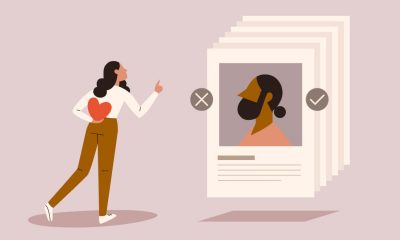Technology
I joined Google+ to escape Facebook. It didn’t work.

After my college boyfriend and I broke up in the winter of 2011 (my senior year in college), I began to suspect he had a new flame, in large part because of the photos that started to appear on Facebook.
“That was taken from the perspective of his bed,” I remember thinking about one. “What would *she* be doing on his bed?”
These investigations caused occasional bouts of anger, or acceptance, or acting out on my side of the net. As others have chronicled before me, social media makes letting go of a relationship even harder.
By the summer of 2011, I had graduated college and moved to New York to work at a music venue. I was angsty, but happy and meeting new people, staying out late, behaving questionably. Then, during a quick stop to my windowless Brooklyn bedroom in between parties on a brutally hot 4th of July, a skim of Facebook on my laptop made me snap.
My ex-boyfriend was officially “In A Relationship.”
Without tears, without even thinking much, really, I took a plunge I’d been contemplating for a while. I deactivated my Facebook account then and there. Then, I slammed my laptop shut, swapped one crop top for another (hell ya), and headed out to a rooftop party to watch the fireworks.
I may have gone Facebook delinquent, but I wasn’t about to commit total social media suicide. I still had the hottest new platform of the moment in my arsenal: Google+.
I remember thinking, when I joined Google+ in late June 2011 just after its launch, oh, maybe this way I can quit Facebook! The ex-boyfriend updates and I think just the whole scene of performative life that was Facebook in 2011 — especially during the immediately post-college time of life, full of stress about who you are and what you are doing with your life — was getting a bit much for me. I was looking for a way out.
Plus, you needed an INVITATION to join Google+. You could create circles — how exclusive. My mom hadn’t heard of it. My friends were writing about it in their internships. And I could help lead the migration; at that time of my life, I was actually a semi-professional party planner. Google+ could be the digital iteration of that.

The party’s here, I swear!
Image: screenshot: rachel kraus/mashable
Back then, I didn’t know how short lived Google+ would be. It was a failure almost from the start. And in December 2018, Google announced that its last day of online existence would be in April 2019. A grand experiment, failed.
But in 2011, the buzz and the apparently exploding user base made Google+ feel like it had actual potential. So I led the charge of bringing my recent grad friends over. I was *active* on the platform. I invited friends and created circles and even commented publicly for a CNN article about why I was turning to Google+ over Facebook.
There was just one problem: nobody showed up to my digital party.
The biggest problem with Google+ even then was endemic, and ironic. Nobody used Google+ because not enough people used it. Even in 2011, Facebook was already too big to fail, and too big to compete with as a mirror alternative. It would take a fundamentally different value proposition — like Instagram’s aesthetic-first photo stream, and Snapchat’s disappearing images — to actually create a new world.
Google+ just didn’t have anything new. So, if you’re not escaping the social media updates of an ex-boyfriend’s new girlfriend, why move?
I must have suspected this even then. When I left Facebook, I chose to deactivate — not delete — my account, essentially keeping Facebook on the back-burner. A digital playmate I could go back to any time.
Today, it’s tempting to say that Facebook’s star is falling. You’d be forgiven for drawing that conclusion from recent headlines about dropping stock prices and user attrition. However, Facebook has a similar invincibility today, but it’s just disguised. Because Facebook has acquired Instagram and WhatsApp, buying or stealing the innovations of its competitors, it’s hard to truly leave it, even if we try.
And, despite a year of scandals, Facebook ended 2018 with record profitability.
After quitting Facebook that day, I went to a new party where I ended up dumping the contents of a bottle of ketchup on a boy’s baby blue polo shirt as retribution for insulting me; a Facebook-less life was not a drama-free one. I refused to pay for his dry cleaning.
Quitting Facebook did not enable me to leave my social network behind, taking a select few friends with me to the (empty) greener pastures of Google+. It did not, obviously, catch on. I ended up reactivating Facebook 6 months later. My friends went back and tagged me in all the photos I’d missed, where they’d simply tagged a stand-in name, instead: The Ghost of Rachel’s Facebook.
Like a new fling, for a few months I put my hope in Google+. But it turns out that a social network with neither the social nor the network is no fun.
But I’ll remember the good times, Google+. We got to be two petty hot messes, together, young and new to the world, filled with the youthfully egotistical belief that the universe would be as we made it.
It may have been brief, mon ami. But at least we tried.

-

 Business6 days ago
Business6 days agoLangdock raises $3M with General Catalyst to help businesses avoid vendor lock-in with LLMs
-

 Entertainment5 days ago
Entertainment5 days agoWhat Robert Durst did: Everything to know ahead of ‘The Jinx: Part 2’
-

 Entertainment5 days ago
Entertainment5 days agoThis nova is on the verge of exploding. You could see it any day now.
-

 Business5 days ago
Business5 days agoIndia’s election overshadowed by the rise of online misinformation
-

 Business5 days ago
Business5 days agoThis camera trades pictures for AI poetry
-

 Business5 days ago
Business5 days agoCesiumAstro claims former exec spilled trade secrets to upstart competitor AnySignal
-

 Entertainment7 days ago
Entertainment7 days agoDating culture has become selfish. How do we fix it?
-

 Business7 days ago
Business7 days agoScreen Skinz raises $1.5 million seed to create custom screen protectors






















